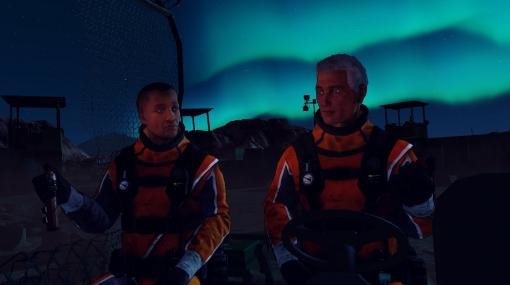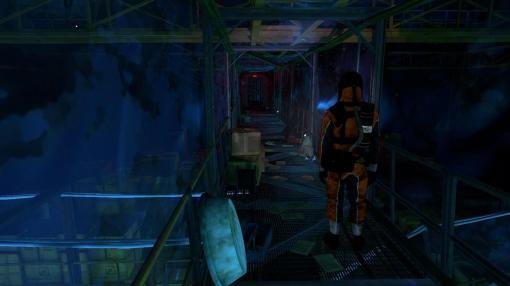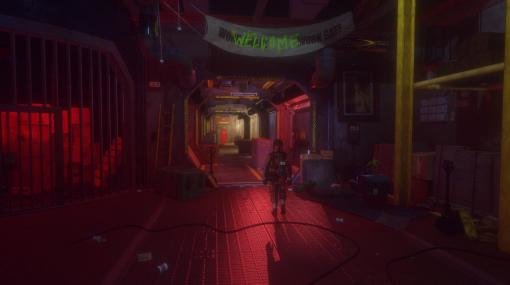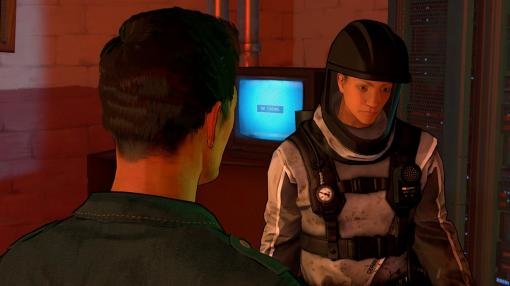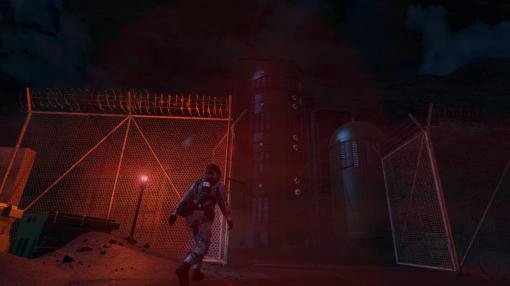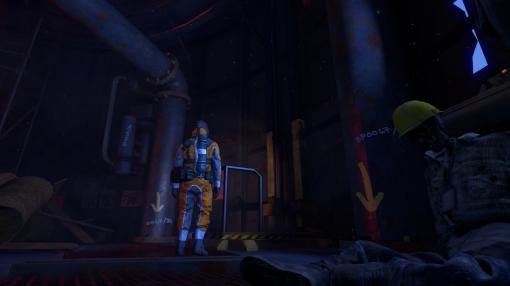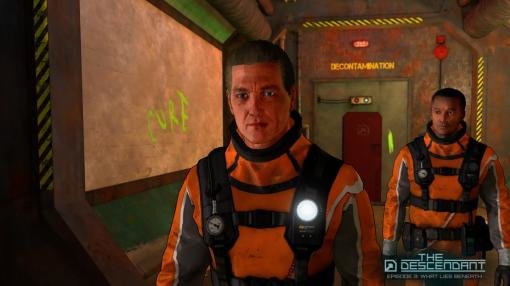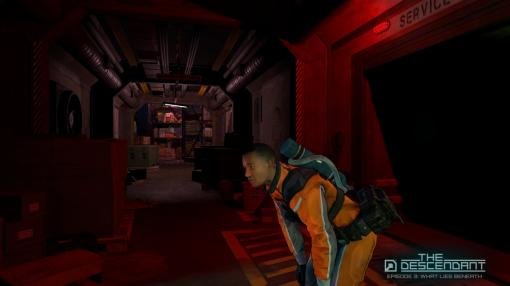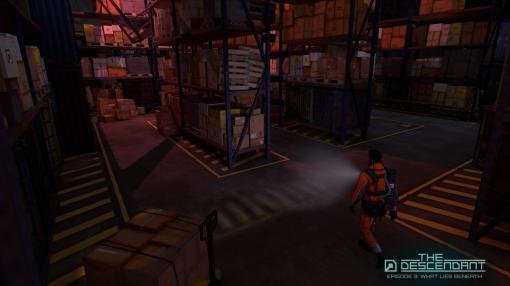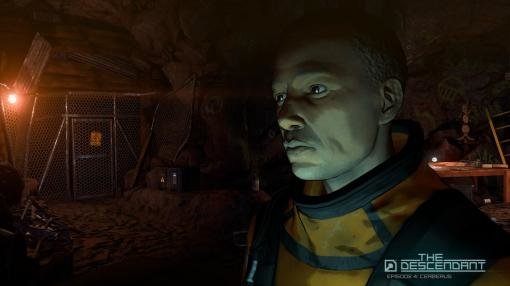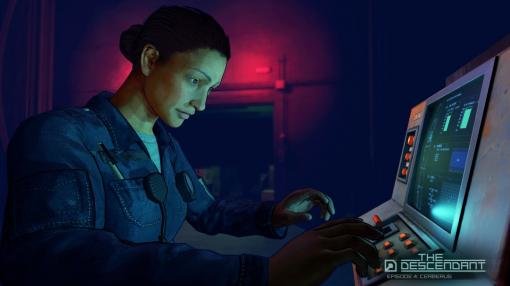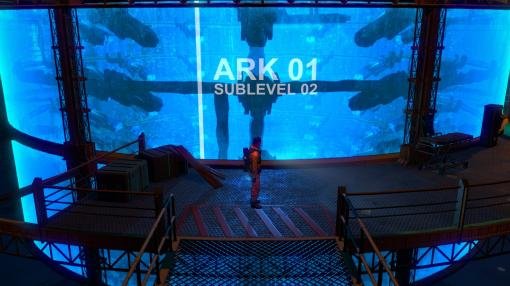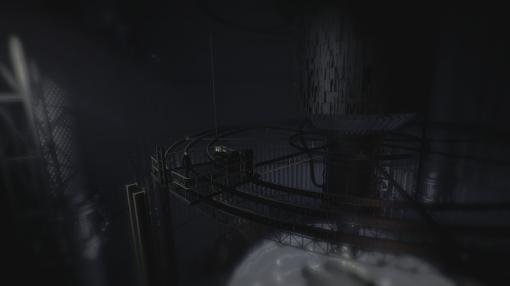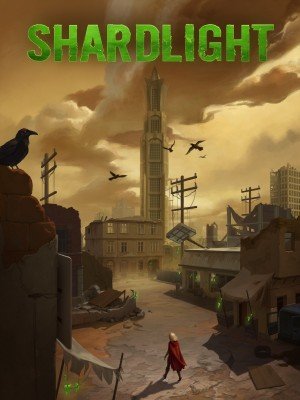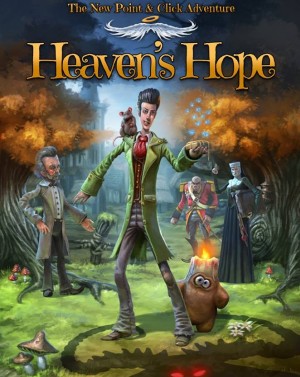Review for The Descendant
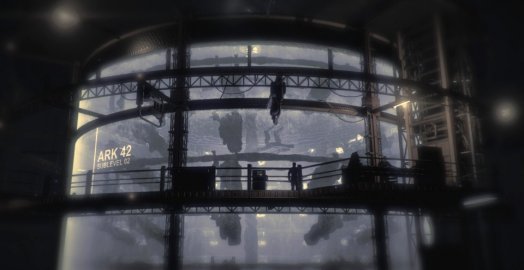
Take me straight to Episode 5!
Episode 1 - Aftermath
"No-one was surprised when the world ended. There was only one thing that no-one expected: that the world would one day start again."
These ominous words set the scene (and the tone) for Aftermath, the first installment of The Descendant, a post-apocalyptic episodic adventure from indie Swedish developer Gaming Corps. From the cinematic camera angles and overlaid titles of the opening scenes to the "Next time on The Descendant" trailer at the end, this is designed to be a television series in game form. That means we get slick production values and atmosphere aplenty, but also limited interactivity and a TV show length. Add in a predictable plot and one-dimensional characters so far, and after the first of five planned episodes, the series is off to a slightly shaky start.
As apocalypses go, this has to be one of the trendier ones: with mankind having failed to listen to the warnings, global warming has irreversibly messed up the environment, causing crops to fail, riots in the streets, crumbling governments, escalating international tensions and, ultimately, nuclear war. If only they'd found a way to work terrorism in there, we'd have a full house of contemporary worries. Fortunately, the politicians had just enough foresight to build a network of bunkers called Arks before the bombs dropped, where the lucky few would be held in cryogenic stasis until the radiation had died down and the world was habitable once more. Comprising a mere 4000 of our best and brightest (and a few politicians), these are the titular Descendants, a second chance for humanity. Watched over by sophisticated automated systems, each Ark also has a couple of Janitors, human technicians who can be woken from stasis whenever a serious problem arises.
Fast forward three hundred years or so, and it's time for the Arks to wake up. Most of them do, but one (Ark-01) stays stubbornly silent, so a two-man team is sent to look into it. As the story develops, the action jumps back and forth in time between these investigators in the present and Ark-01's two Janitors about three years after the bunker was sealed. You play as both Donnie, a former Janitor with a chip on his shoulder who’s now an investigator, and Mia, Ark-01's resident engineer. While Donnie makes his way into the Ark in modern times, Mia is awakened in the past to deal with a malfunction that threatens the sleeping Descendants. Add in a hint that this particular Ark's overseeing AI is an advanced but not-quite-finished prototype and you have pretty much the whole plot, at least of this episode. Just as things are starting to get going, with Donnie and Mia both making worrying discoveries, the credits roll on a cliffhanger ending.
Graphically, The Descendant looks great, particularly considering its small development team. Using the Unity engine, its 3D graphics have been given a lightly cel-shaded look that lends them a comic book feel, particularly for the main characters. At times, you could be forgiven for thinking that the four leads were filmed live and post-processed to make them fit in: the natural movements, lip sync and detailed textures make it hard to tell otherwise, at least during the cutscenes.
The environments aren't as detailed overall, and can look a bit clunky when they depart from their primary diet of shelves, tables and other simple shapes, but they still work pretty well for the most part. The biggest downside is that you spend essentially all of Aftermath in a utilitarian bunker, running around corridors with bare walls and concrete floors, with only pipes and stacks of boxes for company. The Janitors' main hub room manages some posters on the walls, and some deliveries from the "Surveilalot" security company raised a smile, but the setting as a whole feels a bit bland; thankfully, the closing trailer hints at more variety in the future.
Making up for this blandness, we get unusual angles and panning cameras during the cutscenes that really showcase the developers' cinematic aspirations and do genuinely add to the drama. Unfortunately, when it comes time for you to take over, those same cameras can get in the way: they're out of your control, and while they swing round or cut to a different viewpoint in an attempt to give you a better look, it doesn't always work. If you go in a direction the game expects, everything looks good, but if you don't you can find yourself walking into the camera with no idea what's in front of you, inching forward a step at a time until the angle finally swings round to show you where you are.
It also doesn't help that your movements feel awkward. Other than a few keyboard-based Quick Time Events, the controls are purely mouse-based – left-clicking to move, interact or look as appropriate – but your character’s response is always sluggish. Perhaps it's just because of the fluid movement in the cutscenes, but when you're in control the characters walk painfully slowly (or at most at a gentle jog, in times of crisis) and move mechanically by comparison. On occasion, I saw my character stand totally still and rotate on the spot through some kind of programming magic rather than turning naturally. Even in the heat of dealing with urgent issues, Mia moves at a languid pace, undercutting all the game's efforts to build tension.
Music is used, as in a film score, to emphasise significant moments rather than as a continuous background. As a result, much of the time you just have environmental effects for company, or at most a gentle ambient track. It only comes to the fore when events are at their most tense, awed, or frantic, when it breaks into pounding drums, urgent strings and guttural brass. It's very well done, as is the voice work, particularly during the cutscenes. Some of the isolated comments, such as when you look at objects around you, come off a bit flat and unemotional, but overall the four leads turn in a solid, professional performance.
The story is told through a blend of in-engine cutscenes (lightly sprinkled with QTEs) and simplified point-and-click adventure sections with an interface that has been pared back to the bare bones. Hotspots highlight as you mouse over them, showing a label and either a hand (for interaction) or a magnifying glass (to look); you can only ever do one or the other, not both. There's an inventory at the bottom left, but that's just for information: instead of applying an item where you want to use it, you simply interact with the hotspot and the object will be used automatically. To further streamline things, objects you don't need right now aren't even highlighted: run into a problem, and a bunch of hotspots appear. You're regularly sent on scavenger hunts around the immediate area, which is suddenly full of hiding places, most of which are empty. You're never allowed to pick up an object unless it's actually useful.
All this makes for inventory puzzles so simple that they're barely puzzles at all. These are mixed in with similarly straightforward environmental obstacles that have you turning valves, flipping switches or doing a little rewiring. The aim here is to help you feel involved in the story, not to tax your brain. Especially when you consider that many of them have to be solved in the middle of quite pressured situations, it just doesn't make sense to have the player pause too long. Instead, you're given busywork to do, running around frantically trying to find the widgets you need while your increasingly anxious partner shouts at you. As a way of building tension, it's actually pretty effective – or at least it would have been, but for the sluggish animations undercutting it all.
The developers promise "meaningful and difficult choices with branching dialogue", but Aftermath really doesn't achieve that. There is only a handful of seemingly significant decision points scattered through the game, each of which has a countdown timer. These opportunities give you the chance to pick an option or (if you let the timer run out) say nothing. The problem is that none of them have any obvious lasting consequences, at least to this point. For example, Donnie can choose to deal with his ex-Senator partner diplomatically or abrasively, but aside from some different dialogue immediately afterwards, they continue to work together either way. Other choices let you decide whether or not to lie to your partner, have Mia pick her field of engineering expertise, or tell your partner off for driving the motorcart too fast. Every time, it's an isolated and fairly minor decision and as far as I can see the plot is entirely linear. That said, I was told several times that a character would remember my choice, so it’s possible that I'll feel the effects in future episodes.
The one obvious way to have a permanent and significant effect on the outcome is to fail one of the puzzles. You're told repeatedly as you're working on it that time is critical, and that turns out to be true: take too long and bad things happen. I'm used to games telling me time is short, but that's generally for show, to build tension without actually having a real time limit. Here they're not kidding around, and there's no explicit timer; you only know you've taken too long when disaster strikes. Even then, though, you still complete the game in much the same way. The effects of your failure are real, but happen off-screen and feel a bit remote. It's also not really a choice, in the sense that the outcome is clearly bad. The only choice here is whether to play again and try to rectify your mistake, or live with the consequences of your actions.
It really would be a case of playing again, too. The game autosaves periodically as you go, but you can only continue from the most recent checkpoint and there's no way to manually save your game. The only way back from a mistake is to start again from the beginning, unskippable cutscenes and all. In that sense, it's perhaps fortunate that you can play through the whole thing in under an hour.
The short length and unremarkable plot could be excused if the time was used to introduce memorable, distinctive characters that we could grow to care about, but sadly we're only given a cast of one-dimensional archetypes. There's ex-Senator Randolph, with a great sense of his own importance and that of the other Descendants (if not so much the Janitors), a typical politician full of eloquent but hollow words. By contrast, Donnie feels he's babysitting Randolph, keeping him out of harm's way while he does the real work. Janitors Silas and Mia are even more abstract, professionals doing a job with only the barest attempt at humour to distract from the ever-present tension. We learn that Silas is liable to crack under pressure and isn't the tidiest when he's left on his own, but that's about it. There's nothing about their backgrounds, interests, or family life, no obvious connections between any of the four main characters, and no reason to think any of the 108 Descendants sleeping in Ark-01 are anything special. We just have the Senator, the Investigator, the Med-tech and the Engineer, with all the depth of Cluedo characters. Presumably that will change over the course of future episodes, but for now they're ciphers, pawns to drive the plot.
To sum up, then, episode one of The Descendant is a glossy interactive TV show, its attractive and cinematic graphics and music undermined by the predictable plot, stereotypical characters, simple puzzles and all-too-short length. The promised branching narrative also hasn't materialised, at least not yet. While the air of unsettling tension that sits over the whole affair helps drive it forward, it also provides little variety or scope for levity. That said, Aftermath feels like the first half of a two-part season opener. If Gaming Corps can pull an eye-opening twist out of the bag in the next one, this series could yet grab my interest, but for now it's just too by-the-numbers to really recommend.
Episode 2 - Into the Storm
Last time on The Descendant, we were introduced to a post-apocalyptic world where a chosen few were cryogenically preserved in bunkers known as Arks, tended by AI systems and human Janitors. Gorgeous cinematic production values couldn't quite make up for limited plot and character development and simplistic puzzling in the debut instalment. This time, in Episode 2: Into the Storm, the cinematic feel is still in full force, but the characters are a little more rounded, the puzzles are a little more interesting, and the plot, while still slow going, is starting to pick up steam.
Most of the first episode was taken up with Donnie and Randolph making their way into Ark-01, and flashing back to Mia and Silas dealing with a crisis in the water heating system. Only near the end did we start to get hints as to the broader story, and what might have gone wrong. This episode follows the same path, except that now all four main characters are engaged in getting an air filtration tower up and running. Most of the time is spent dealing with immediate practical problems and, again, it's only really in the last 5-10 minutes that we get a trickle of the larger arc, with a two-pronged conspiracy rearing its head. There are hints that the Ark's problems are part of a plan that got away from the conspirators. It's also clear that there are two different agendas at play here, neither as simple as the original mission to wake the Descendants.
Sometime in the future, if and when the complete series has been released and players can binge play the whole story in one go, this kind of steady drip feed could work, but as it stands there's just too little to chew on while we wait for the next episode. All the ingredients are there for a solid sci-fi potboiler, with systems out of control and conflicting interests at play, but there's just no detail to give it any shape yet. We're less than halfway through, and the developers clearly don't want to blow the suspense they're building by giving away too much too soon, but that decision is making it hard to stay engaged.
That said, this episode does a much better job of using all that busywork to let us get to know the characters, or at least their personalities. There's still precious little background information, and what is provided is painfully cliche. (Donnie, who's black, turns out to be a former boxing champion who works hard but has authority issues.) But we get to see Mia and Silas arguing like an old married couple over where Silas put the locker key, and just why they became Janitors in the first place. Was it to safeguard the future of the human race, or just to survive themselves? Likewise, Donnie and Randolph are getting to know each other, with Randolph's smooth politician exterior starting to crack and the chip on Donnie's shoulder slowly slipping off. All four are starting to feel more like real people and less like stereotypes, and their dialogue generally feels more natural this time.
The puzzles, too, are definitely meatier than in Aftermath. This episode is only slightly longer, clocking in at around 75 minutes for me, but there's quite a bit more to do. You're still unlikely to suffer from brain strain, but the goals feel more significant here and even the more routine tasks are enlivened by flashes of character development rather than simply being an excuse to give you control for a bit. Last time, there was only really one notable puzzle section, as Mia fought to get the water heater back online. This time, getting the air filtration tower going is both more complex and something both groups have to do (in different ways). A particular highlight for me was when Donnie had to talk Randolph through a task using a manual found nearby. Listening to his descriptions, looking stuff up in the manual, and hearing his happy cries as my advice worked, it felt like a genuine moment of collaboration.
The air filtration tower is also a fairly interesting new location, with multi-level walkways, hanging cables and huge pipes jostling with computer equipment and shelves of supplies. While not hugely exotic, it's a nice change after the endless hallways and Janitors' common room that made up most of the environment before. Right at the end, we also get a magnificent view of the sunset from the top, making for a memorable ending. In addition, the journey there gives us our first opportunity to venture outside, trudging against the howling wind through a desolate landscape full of abandoned equipment and vehicles.
One drawback of Into the Storm is that virtually nothing can be looked at more closely, aside from the objects needed to continue and a few more scattered around as red herrings. Last time, you could at least look at posters on the walls, Silas's guitar or the mess on the table; this time, nothing. In that whole outside area, for example (the largest single area the game has offered so far), the only things you can interact with are the gate to the tower and a few objects strewn around it. Granted, you're short on air and shouldn't really be sightseeing, but it would still have been good to get my character's take on the surroundings.
There have been a couple of small but welcome tweaks made: characters now walk at a more normal kind of speed, rather than their previous glacial pace, and animations seem a bit smoother and more natural. On the downside, more complicated animations – even something as simple as walking up stairs – are often omitted entirely in favour of a fade-to-black with sound effects. Given the small development team and short development cycle, though, that's perhaps understandable.
Also understandable, if no less of a shame, is the fact that the "meaningful and difficult choices" we were promised have yet to appear. The choices you make are definitely remembered – at one point Randolph mentioned a decision I made in the last episode – but so far they only seem to result in small tweaks to dialogue. A couple of times it felt like I was about to do something significant, but after playing through again and going down the other path, events turned out essentially the same. At another point, when it seemed like I was about to get a pivotal decision to make, the game just decided for me. Your performance on some of the puzzles is definitely tracked and has an impact on the world, but not how the plot plays out. All this is probably inevitable given the logistical nightmare of tracking multiple plot branches this early in the series. I just hope that, later on, all these choices will at least factor into different endings.
All things considered, Into the Storm is a step forward for the series – not revolutionary but definitely evolutionary. The characters are starting to be better fleshed out, there's more to do (if less to see), and it feels like the main planks of the story are starting to slip into place: events are moving forward, just a bit more slowly than I'd have liked. All the groundwork has been laid for a solid and satisfying story to emerge, and I hope our patience will soon be rewarded.
Episode 3 - What Lies Beneath
The latest update to The Descendant brought both a new episode – Episode 3: What Lies Beneath – and some pretty significant changes to the previous two. Gaming Corps really seem to be listening to player feedback, and working hard to both sort out issues and polish their ongoing creation.
The most obvious change hits you straight away: there's a whole new voice cast. All the dialogue has been re-recorded, and the script has been tweaked a little here and there as well. At first this seems like a surprising move, since the previous cast were perfectly competent, if a bit bland at times. However, it soon pays off, as the new actors bring significantly more emotion and power to the table, resulting in much more engaging performances. At times things perhaps swing too far the other way, with even simple comments uttered like they're a matter of life and death, but overall I got a much better sense of the characters' personalities and just how tense and fractious they must be feeling. They felt like real people in a way they hadn't quite before.
In related news, the vocal upgrades have also made the conspiracy that was revealed in the second episode much clearer. We were supposed to overhear the plotters discussing their plans over the radio, but previously everything was too muffled to make out that much. Now it's like they left a door open and decided to speak up a bit, meaning I picked out a number of small but possibly important details that I totally missed before.
Aside from that and the usual bug fixes, there's also a save system of sorts now. Although you're still reliant on the game autosaving, you do get three slots to work with. Each slot, essentially, represents an independent playthrough, meaning you can make different choices without disrupting what you did the first time. In a game focused on the impact of your choices, this is very welcome.
With that taken care of, let's jump into What Lies Beneath. Here, at last, is Silas's turn in the spotlight. Where previous episodes have focused on engineer Mia and her efforts to repair the Ark's water heating and air filtration systems, this time it's Silas's medical skills that are called upon. Through a series of flashbacks, we also get to find out just what Silas was up to while Mia was hard at work; as it turns out he was having quite a torrid time of it! I won't spoil it, but his calm manner over the radio during those incidents belied what was actually going on. The strains of Janitorial life are clearly taking their toll, even as they give Silas's new voice actor a chance to shine. This section also makes innovative use of the QTE system, using it not so much to allow you to make a choice as to allow you to experience Silas's struggle.
This is also, finally, where the four protagonists' pre-Ark lives start to intersect, and we begin to see what their real motives are. On top of that, the Ark's administrators are also called into question when it turns out that Ark-01 was supposed to have twelve Janitors, not the two it actually received. The guys at HQ are even bandying about allegations of treason, when all any of the Janitors seem to be doing is trying to help. Previously, we've seen Donnie undergoing fragments of a rigorous post-incident interrogation. Was that because he and Randolph failed, or because they succeeded too well and uncovered something others would rather was left buried?
This episode's title is well-chosen, as in addition to the hidden motives that are coming to light, Donnie and Randolph spend their time delving into the Ark's lower levels. Randolph is clearly searching for something down there, but what?
This, unfortunately, is where things come a little unstuck. Just as the plot seems poised to reach a boil, thanks to the series' most gripping opening yet, it's all put on pause while you spend the middle third of the episode running around fixing computers and trying to get a keycard upgrade that will let you into the really interesting parts of the Ark. The puzzles here are solid enough, asking you to flip switches, play with wires, mess with circuit boards and, for some reason, solve some simple mazes. The problem is more that it feels like busywork and comes in one uninterrupted block. Ironically, a glitch that (currently) lets you skip most of it when you replay the episode on the same save actually helps the flow of the story.
Initially, it also feels like this section is an excuse to re-use existing locations, as you're sent to the water heating room, the air-filtration tower and the communications room (where the conspirators were conspiring). However, these have all been fleshed out over what we saw before. Even if they hadn't, between Silas's infirmary and the large basement area, there's plenty to explore – at least, so long as you like industrial architecture. The only slight niggle is that as you walk around the maze of corridors, the constant flicking from one fixed camera to another makes it all too easy to get disoriented.
One other place where I feel the episode trips up is during an early puzzle where you're trying to gain more access to the computer. Throughout the story so far, the Ark's AI has been a brooding, menacing presence, waiting to punish you for your interference. Each time, you've been able to largely or entirely evade such consequences by making the right choices (and it's very clear that there are "right" and "wrong" choices). Here, as you might expect, too much tinkering will come back to bite you, but on the other hand it also unlocks some nice insights into Silas's life before Mia arrived. It's a shame, then, that you're encouraged to stay away from them – or at least, replay the episode after you've read it all.
Overall, however, the puzzles here are another small victory for the series. The emphasis this time is mostly on abstract problem-solving, manipulating machines rather than inventory items, but it's definitely a step forward in terms of both quality and quantity. Things started slowly and easily in the first episode, but as time has gone on there's been more and more to do, and the difficulty level has also been rising a little. Not enough to challenge a seasoned adventurer, maybe, but plenty to keep your attention without alienating the broader audience the developers are targeting.
Once over the half-time hump, the pace starts to pick up again. Donnie and Randolph have a narrow escape, possibly because they're getting too close for someone's (or something's) comfort, while Mia wakes up alone and disoriented. As the credits roll, they're all preparing to face the unknown, and quite possibly their destiny. After a slow start, the story is finally starting to clarify, the threads are intertwining and everything is building nicely towards a final showdown.
What Lies Beneath wraps a stellar top and tail around a slightly soggy middle act, and sprinkles it all with some solid puzzling. After being on the fence early on, I'm really starting to warm up to The Descendant, and am now eagerly awaiting the arrival of Episode 4.
Episode 4 - Cerberus
The fourth episode, Cerberus, certainly starts off with a bang. Or rather, a raging inferno that's almost certainly not accidental. Between escaping the fire and dodging the all-seeing eyes of the security cameras, the opening few minutes are action-packed. (They also do a great job of getting the adrenalin pumping with the threat of impending danger and making you feel like you just made it in time while actually being pretty forgiving.)
That sets the stage for a confident episode, and one that builds on the momentum from last time to leave us on the precipice of finally understanding what's been going on in Ark-01. Where previously the cake has been baked with a crispy top and bottom but a rather soggy middle, this confection is much better balanced. While it wisely doesn't try to maintain that initial hectic, breathless pace, there's a steady sense of progress as our heroes approach the heart of the Ark, both literally and metaphorically.
So far, the Janitors' quarters have mostly been the hub of proceedings, but the four protagonists have lately begun to cast aside this (relatively) cosy safety and wander farther afield. Picking up where we left off, this time we're breaking out of warehouses to explore caves, a subterranean monorail and what can only be described as an underground lair. Not to mention being led down corridors that look to have been built for giants and at last encountering the vault door that protects the most precious wealth mankind has left: the Descendants. All too often, previous environments have felt mundane: offices and corridors that could have belonged to any old industrial facility, with only intermittent hints that we're in a secret bunker at the end of the world. Now, at last, things are starting to feel a bit more exotic.
Without wanting to give away too much, it's also finally time for the Ark's all-encompassing artificial intelligence to come out from the shadows and reveal more of its true motives. Unlike the Cerberus of Greek mythology, it's a guardian not so much of the dead as the living, and it has heads and tentacles throughout the Ark. In one of the series' most quietly sinister scenes, a simple text-based conversation on a computer screen, the AI comes across as curious, alien, and coldly rational in its attempt to confront the invaders directly. Has it grown out of control, or merely become what it was intended to be? Is it a threat, or the key to saving the Descendants? And who is the real monster here?
To emphasise that last point, the signs of stress that have been building in one of the Janitors come into full flower here, with some powerful scenes of ranting nervous breakdown that manage to bring out the pain and confusion as well as the disturbed, threatening anger of someone put in an intolerable situation and left to go off the deep end. Or is that all there is to it? Was this part of some twisted plan, or merely a tragic side-effect? Either way, the investment Gaming Corps put into improved voice acting pays off handsomely again here, with performances that are deeply emotional without chewing too much scenery.
Character development also takes a seat at the top table. Donnie and Randolph get to spend some quality time together, as do Mia and Silas (though under rather more troubled circumstances). We learn a bit more about the Senator's history, gain a deeper understanding of Silas's views, and just generally get a better feeling for everybody involved. Mia is still a bit of a cipher, especially given the conflicting hints about her that are floating around, but her essentially decent nature shines through. The situations are still too tense to allow much in the way of banter, but at least these people feel more natural and human than merely (as in the first episode in particular) the living embodiment of stress and grumpiness.
Everything that comes into focus this time, every question that gets answered, winds up begging other questions. An AI running amok is a tired genre cliché, as is the character who gets pushed too far and loses it. Here, though, these issues are both handled in an intelligent, thought-provoking way that sidesteps the obvious. Perhaps by the time the dust settles, one will wind up powered down with extreme prejudice and the other shot or locked away, but it seems unlikely to be as simple as that. Even at this late stage, the story could still go in several different directions, and that's refreshing to see.
The puzzles continue to be straightforward but nicely varied. Escaping the fire turns the warehouse shelves into a small maze, while gaining access to the AI again uses logic puzzles as a surrogate for hacking. In between, you're distracting security systems, piecing together keycodes, tinkering with locks and rerouting the monorail. There's a bit more to see as you roam around, too, with a refreshing number of hotspots that are there for interest and colour alongside the ones you need to progress. While the emphasis continues to be on cinematic storytelling, this instalment does at least take a few tentative steps towards allowing you to find things out for yourself by exploring your surroundings.
Overall, Cerberus really shows this series coming into its own, building on the lessons that have been learned from the previous episodes. The painfully slow start and seemingly bland, cookie-cutter plotting have given way to something altogether more subtle and interesting, with its own distinct personality. The characters, too, are becoming more defined (at least by sci-fi genre standards) and the setting feels less like a half-finished/abandoned factory and more like the last refuge of humanity. The initial struggles to balance story beats with interactivity and puzzles also seem to have been resolved. It's been a steep learning curve, but with the home stretch in sight everything is really coming together, and I for one am waiting with bated breath for the conclusion.
Episode 5 - Ultimatum
Here we are at The Descendant's grand finale, Ultimatum, and I'm sad to say that the series goes out not so much with a bang as a damp squib. All the tension built up by recent episodes is squandered in favour of a plodding last-act opener that jumps straight into exposition overdrive as it tries (not entirely successfully) to tie off all the dangling plot threads and set up a moving conclusion. There are some dramatic moments, to be sure, but also a heaping helping of startling revelations and confused motivations.
Where last time we were thrust straight into the action in trying to escape a burning fire, this time we flash back to Donnie's time as a Janitor on Ark-42. The all-clear has been sounded, and it's Donnie's job to help wake up the Descendants. Jumping back and forth between his past work there and his present efforts in Ark-01, it's potentially a clever way both to draw parallels between the two and give players a tutorial on how the resuscitation process is supposed to work. Unfortunately, what we actually get is mostly busywork: reading numbers off a clipboard, looking things up on a chart and playing spot-the-odd-one-out. With everything going according to plan at Ark-42, for the most part at least, it's also pretty relaxed and that feeling bleeds over to the present day. It's as if all the problems he's overcome to be there never happened and this is just another routine mission.
On the upside, the Descendant chamber does make for quite a spectacular environment: an enormous tank, several stories high, full of cryopods and robotic mechanisms, it's all a sci-fi fan could want. That's just as well, though, as it's identical in both Arks – down to the last bolt, as Donnie remarks – and also pretty much the only setting you'll see this time.
If the slow introduction was all about taking a breather before the twisting, turning, action-packed finale kicked in, that would be one thing. But literally as soon as it has built up to this episode's only tricky puzzle, all the pent-up story points come flooding out in a couple of extended cutscenes that throw out bombshell after bombshell in a headlong rush to the end. Most of it seemingly comes out of nowhere, too, and frankly left my head spinning. Looking back over previous events, much of it at least makes some sense in retrospect, but perhaps the most central plot point feels like it was lifted straight from a Bond villain's bumper book of evil plans. To me, it was totally out of place and would have needed a whole lot more foreshadowing to make it palatable. On top of that, having spent four episodes establishing the lead characters, some of the motivations they finally reveal at the end don't gel with their behaviour up to that point.
Episodes of The Descendant have never exactly been feature-length, but this time you're done and dusted in little more than half an hour. And even that's composed of about twenty minutes of fairly routine gameplay followed by a quarter-hour of frantic wrap-up. Some of the narrative strands I found most interesting are just left dangling, or at best addressed only vaguely. And one new point is raised, seemingly only to be left unanswered.
That's not to say the Ultimatum experience is a total loss. There are some stirring words mixed in with the monologuing, and we at last get a decision with consequences beyond tweaked dialogue, leading to three variant endings. Donnie's final speech, in particular, is powerfully done and made the hairs stand up on the back of my neck. There's also a fun (if easy) little arcade game to break up the cutscenes. It just feels like such a missed opportunity, and came as a personal disappointment after all the hopes I had for the grand finale. That said, some of that is probably down to my own eagerness to read more into what was going on than was actually there. In any case, the series' slow start now makes even less sense than it did; that would have been the perfect time to lay the groundwork these final scenes so sorely needed to have any impact.
Now that we've reached the end of the journey, The Descendant looks more than ever like a mixed bag. One definite highlight throughout has been the glossy, cinematic production values: it looks and sounds great, especially after the mid-season change of voice cast. The dramatic angles, often moving dialogue and stirring music are worthy of Hollywood. Gaming Corps also deserves praise for being so willing to polish their game along the way, releasing regular updates that didn't just fix bugs but also added graphical upgrades and even new areas to already-released episodes.
From there on, though, things get a lot more uneven. The characters took a long time to establish themselves, relying on behaviour rather than background to fill in the details, but they came to feel like (admittedly flawed) friends. Good-hearted Donnie bickering with smoothly political, enigmatic Randolph. Pragmatic, determined Mia. Silas wrestling his demons but trying to do the right thing. It’s just a shame that some of their personalities slipped a bit in the end. The story started slow and seemingly straightforward before growing into something apparently more interesting, only to be sold short by its ending. The puzzles, too, proved rather variable, ranging from little more than excuses to give the player something to do to more organic action-oriented tasks and some neat logic puzzles.
Overall, despite the rough edges I'm glad I played The Descendant. It feels like the product of a studio that's learning as it goes along and – limp conclusion notwithstanding – improving steadily. The story could have been more original, the puzzles more substantial and the pacing better, but it also had some genuinely emotional moments and flashes of brilliance to go with its polished presentation. So long as you set your expectations accordingly, you’ll probably find that Ark-01 is venturing into.


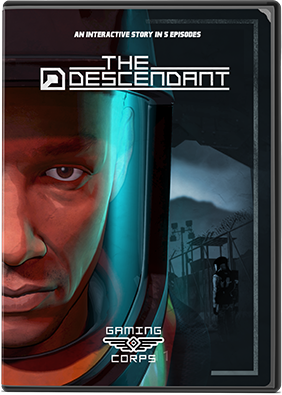
_capsule_fog__medium.png)


